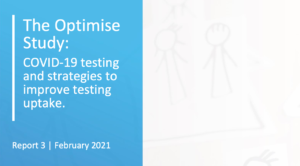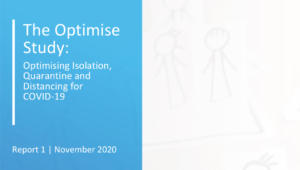Recent Study Findings
Social network analysis findings CARE, CEG and Forum Reports Optimise study related publications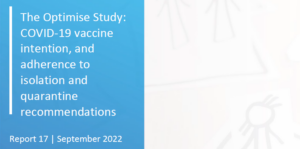
Report 17: The Optimise report for September focuses on vaccine intention, adherence to COVID-19 isolation and quarantine recommendations, and contacts had in the days before testing positive and entering isolation.
Access the report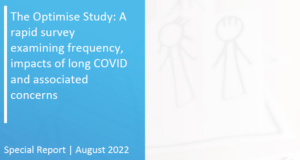
Special Report: The Optimise Long COVID Special Report assesses the proportion of Optimise participants who had experienced long COVID, participants’ concerns about long COVID and any behaviours they used to mitigate the risk of developing long COVID.
Access the report
Report 16: The Optimise report for July explores participants’ COVID-19 related concerns, acceptability of COVID-19 prevention measures and confidence in government over time.
Access the report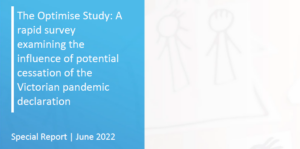
Special Report: The Optimise Pandemic Declaration Special Report assesses Optimise participants’ behaviours under the current pandemic declaration and their potential behaviours should the Victorian pandemic declaration cease and public health orders no longer be in place.
Access the report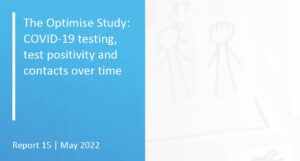
Report 15: The Optimise report for May draws on the findings from several Optimise research activities with the aim to explore participants’ COVID-19 testing patterns, test positivity and changing contacts over time.
Access the report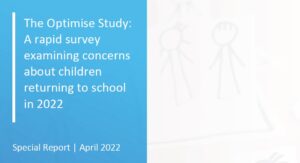
Special Report: The Optimise School Special Report assesses participants’ concerns about children returning to school, COVID-19 testing in schools, views about COVID-19 prevention measures taken in schools, and the acceptability of closing schools under certain circumstances.
Access the report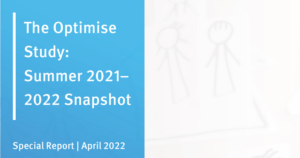
Special Report: The Optimise Summer Special Report assesses participants’ testing and risk reduction behaviours with the aim to better understand the challenges faced by Victorian during the COVID-19 peak in January 2022 and to estimate the likely prevalence of infection.
Access the report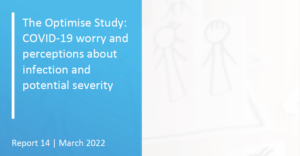
Report 14: The Optimise report for March evaluates the impact of the COVID-19 pandemic on participants’ lives: their main concerns, risk perception, and confidence in the State and Federal Governments’ responses to the COVID-19 pandemic. This report focusses on trends over the past six months (between September 2021 and February 2022).
Access the report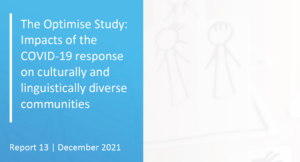
Report 13: The Optimise report for December evaluates how the COVID-19 pandemic and response has impacted people from culturally and linguistically diverse (CALD) backgrounds. It explores participants’ access to information, the adequacy of COVID-19 information, their experiences of financial hardship, their experiences of racism and their expectations post-vaccination.
Access the report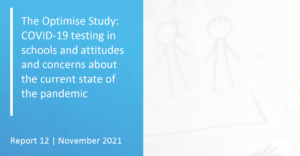
Report 12: The Optimise report for November explores participants’ attitudes towards the frequency of testing amongst primary and secondary school students, the best way to administer the tests and their attitudes and concerns about the current state of the pandemic. Findings from snapshot survey and our Community Engagement Group were incorporated.
Access the report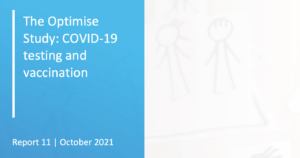
Report 11: The Optimise report for October explores participants’ COVID-19 testing patterns and behaviours, expectations for future testing practices once vaccinated, and their questions and concerns about the use of rapid antigen tests. Findings from the Community Engagement Group meeting are also incorporated. Once again, we would like to thank all of the participants in the Optimise Study for their continued involvement.
Access the report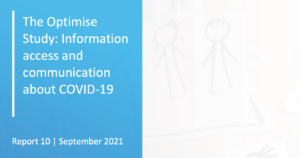
Report 10: The Optimise report for September explores participants’ concerns about the pandemic, their sources of information about the pandemic, and their perceptions of information quality and quantity. Findings from the Strengthening COVID-19 Communication in Pregnancy study is also included.
Access the report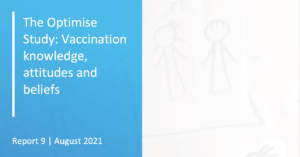
Report 9: The Optimise report for August explores participants’ intentions to be vaccinated, motivating factors and concerns, knowledge and beliefs about vaccination, and expectations for the future. Findings from qualitative interviews, the COVID-19 Work and Health Study, the COVID-19 Attitudes, Resilience and Epidemiology (CARE) survey, Coping with COVID study, and the TIGER C19 study are included as well.
Access the report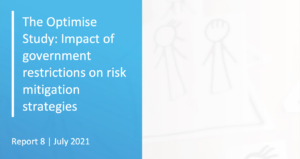
Report 8: The Optimise report for July is now available. This report looks at the impact of government policies and people’s risk mitigation strategies surrounding social contacts & social distancing, COVID-19 testing behaviours and trends, and the acceptability of government interventions. Findings from qualitative interviews and our Community Engagement Group were incorporated. We have also included more findings from the COVID-19 Work and Health Study, conducted by researchers at Monash University, as well as findings from the TIGER C-19 Study for the first time, a collaboration between the University of Melbourne and Burnet Institute.
Access the report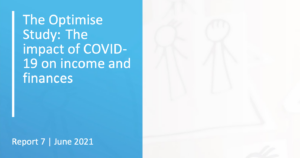
Report 7: The Optimise report for June is available here. This report looks at the impact of COVID-19 on people’s income and finances, regarding employment status, changes to work, financial hardship, and access to financial support. Findings from qualitative interviews and our Community Engagement Group were incorporated, and for the first time, we have also included findings from the COVID-19 Work and Health Study, conducted by researchers at Monash University.
Access the report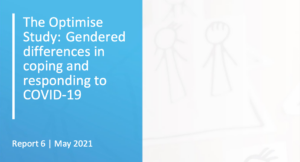
Report 6: The latest Optimise report is now available. This report explores gendered differences in how people are managing and responding to COVID-19 across a range of issues, such as employment, mental health, lifestyle, and perceptions of COVID-19 risk. Findings from qualitative interviews and a Community Engagement Group meeting were also incorporated.
Access the reportReport 5: The Optimise April report is available below. It highlights findings and insights into the social networks and mixing patterns of our participants. Findings from the qualitative interviews, conducted in December 2020, are also included in this report.
Access the report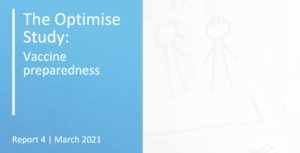
Report 4: The fourth report from Optimise is now available. It focuses on attitudes towards COVID-19 vaccines, concerns about them, and information needs regarding the vaccines and the rollout strategy. We extend our gratitude to all of our participants and partners.
Access the reportReport 3: The third report from Optimise can be accessed below. It also features findings from the design sprint that was conducted in November-December 2020 involving young people, as well as insights from the first Community Engagement Group meeting.
Access the report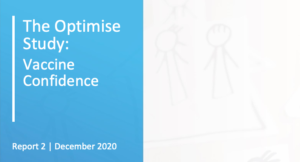
Report 2: The December report from the Optimise Study is available below. Once again, we would like to thank all of our participants.
Access the reportReport 1: The first report on the findings to-date of the Optimise Study is now available. We would like to express our gratitude to all of the participants involved in the study.
Access the report
